- Dec 13
- Drug Addiction Treatment
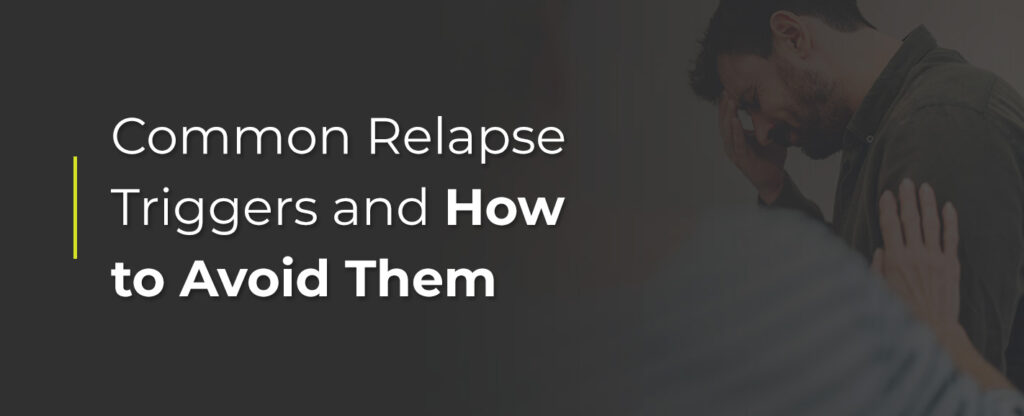
Recovery from addiction comes with a variety of obstacles and challenges. One of them is dealing with the many physical and emotional cues that arise as people go through life, which results in the desire to pick up the substances they are trying to put down for good. These cues are more commonly known as “triggers,” and they may manifest in completely different ways from person to person.
Some people experience a whirlwind of emotions when seeing old friends and loved ones, which can trigger the desire to have a drink. Other people may become so stressed out by the push to perform at school or work that they are tempted by the feelings produced by stimulants. No matter the cause, triggers are a natural part of recovery. Expecting triggers and planning to cope with them effectively is the best way to defend against addiction relapse.
What Is an Addiction Trigger?
A trigger is an emotional, environmental or social situation that drags up memories of drug or alcohol use in the past. These memories can stir up strong emotions that lead to the impulse to use a substance again. Triggers do not necessarily lead to relapse, but they do make it harder to resist the sudden cravings they produce.
Addiction is a chronic brain disease with a relapse rate similar to that of other chronic conditions like diabetes. When people stop their treatment plans for chronic conditions, they are more likely to relapse. Using drugs or alcohol over the long term builds associations between a person’s daily routine and their experiences with intoxication. As a result, certain cues immediately flip the switch on the association and activate the craving reflex in response to external or internal triggers in recovery. Triggers may decrease in frequency the longer someone abstains from substance use, but anyone in recovery needs to be prepared to respond appropriately when triggers do arise.
 Common Relapse Triggers
Common Relapse Triggers
There are many categories of addiction relapse triggers, and they fall into multiple groups. They can be emotional, environmental or mental, and often a trigger falls into multiple categories. These are 10 of the most common triggers in addiction recovery, along with quick tips on how to avoid them.
1. HALT: Hungry, Angry, Lonely, Tired
The HALT acronym helps those in recovery keep an eye on some of the most basic human needs that can lead to or intensify triggers if not fulfilled. Being in any one of the HALT states reduces a person’s ability to cope with stress and increases impulsivity.
Do your best to plan meals, engage in mindfulness, seek out social support and stick to a regular sleep schedule. Doing so will provide a baseline that helps reduce reactivity to triggers.
2. Challenging Emotions
Negative emotions like sadness, guilt or anger are often core reasons why people begin abusing substances in the first place. When these emotions crop up again during recovery, the brain remembers dealing with them using drugs or alcohol and prompts cravings.
No one can avoid negative emotions altogether. To keep emotions from causing a relapse, people in recovery need to learn coping skills to avoid triggers that can be discovered through therapy.
3. Stress
Both chronic and acute stress increase the risk of drug addiction and may be the most common triggers for relapse. Stress is a part of daily life for most people, whether it’s being late to work in the morning or tense relations with a loved one. Health problems, increased responsibility and other events can result in stress that triggers drug cravings.
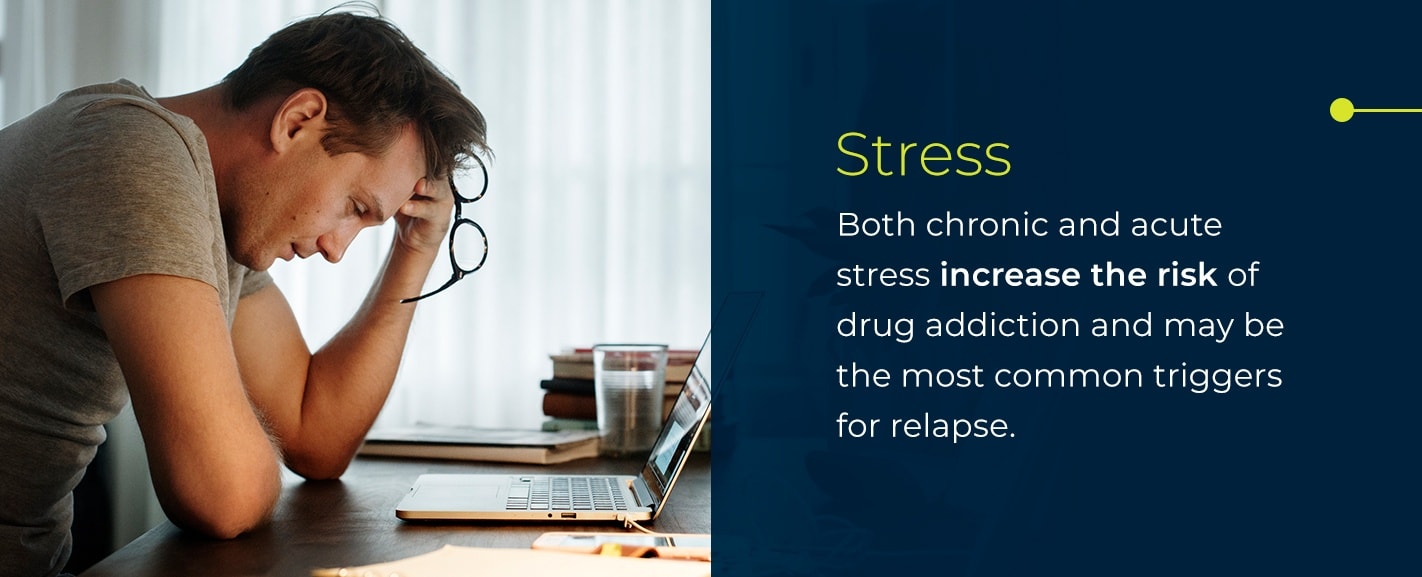
4. Over-Confidence in Recovery
Recovery is a journey with no end, yet some people begin to feel that they are cured and don’t have to worry about triggers anymore. It’s important to develop a healthy level of self-confidence, but humility is necessary too. If someone forgets that addiction is a chronic condition, they may be tempted to have “just one” drink, injection, hit or bump with the expectation that it won’t be a big deal. This leads to riskier situations and eventually a full relapse.

5. Physical or Mental Illness
A variety of underlying mental illnesses like depression and anxiety are closely related to addiction and can result in a person experiencing more triggers or more powerful ones. Physical illness and chronic pain also stress the body and can increase the risk of relapse.
When you see a doctor or mental health specialist, let them know that you are in recovery. Insisting on non-addictive prescriptions and alternatives to medication can help eliminate a potential source of triggers.
6. Social Isolation
For many people, engaging socially and forming a support system in recovery can feel exhausting. Some people will try to avoid it altogether, which can lead to prolonged isolation and mounting loneliness. Without other people around, it’s easier to talk yourself into drug or alcohol use and rationalize it.
Struggling with social anxiety is common for people in recovery, so having a sponsor or trusted friend to turn to is a good start in avoiding isolation and its associated triggers.
7. Romantic Relationships
Anyone who has been through a breakup knows the emotional fortitude required to move on with life. On top of the upheaval associated with addiction recovery, romantic relationships can create devastating tides of emotion that make a person feel lost an out of control — both powerful drug addiction relapse triggers. There is no need to remain single forever, but actively choosing to avoid romantic relationships for at least the first year of recovery is a good rule of thumb.
8. New Jobs and Promotions
It’s not just negative events that can result in addiction relapse triggers. Getting a new job or earning a promotion can trigger a relapse in a couple of different ways. For one, you might be tempted to use again “just this once” as a means of celebrating. Planning sober festivities is one good way to stay on track.
There is also the stress and pressure associated with new or greater responsibilities. Having to learn new skills and perform well in a new role can lead to anxiety and stress.
9. Nostalgia for Substance Abuse
Addiction happens because the use of drugs or alcohol makes a person feel better in some way. Although someone in recovery knows that their addiction was harming themselves and those around them, it’s fairly common to view past substance abuse through rose-colored glasses.
Reminiscing about or dwelling on memories of past substance abuse is one of the brightest red flags in terms of triggers and relapse. If you find yourself stuck thinking about drugs or alcohol, it’s time to get your support system involved. Talk to a counselor, supportive friend or your sponsor to help remind you why you’ve chosen recovery.
 10. Places and Situations Where Drugs Are Available
10. Places and Situations Where Drugs Are Available
It’s not always easy to avoid being around substances of abuse. Alcohol is particularly difficult because so many people view drinking as normal, and it can crop up in unexpected places like office parties or even a neighborhood potluck. It’s important to make a list of people, places and things that are significant triggers for you so you can avoid putting yourself in a situation that may support relapse. Enlist the help of a friend, counselor or sponsor to get down the triggers you may not think of right off the bat.
How to Identify Triggers in Recovery
There are two main types of triggers to be aware of — internal triggers and external triggers. External triggers are often easier to identify, as they are people, places, things and activities that make someone want to use drugs or alcohol again. Internal triggers can be more difficult to identify as they are feelings that are often complex.
One important study examined the effect of visual triggers in people who were former users of cocaine. Researchers showed the participants photos of cocaine and related situations and found that the images resulted in a subconscious emotional response in the brain. The researchers observed a rapid activation of the pathways related to drug cravings.
These subconscious responses and cues from the brain are particularly dangerous for people in recovery, as they reinforce the desire to use drugs or alcohol without the person even being aware of it. The researchers concluded that avoiding people, places and objects that recall former substance abuse is crucial to maintaining recovery.
1. Other People
One of the hardest triggers to avoid is other people. Family and friends who use substances put people in recovery in a perilous situation where they may be tempted to accept a drink or consume a drug. Even people who don’t use illicit drugs can be a trigger threat to someone in recovery. They might think it’s okay to offer a drink to someone in recovery from addiction to another substance like heroin, not realizing that alcohol consumption may trigger a desire for a different type of intoxication.

- Former drug dealers
- Co-workers
- Employers
- Neighbors
- Spouses or partners
2. Physical Locations
A “high-risk” location is one that brings up memories of time spent engaging in substance abuse. Driving by a bar you used to frequent or a neighborhood where you used to hang out with a friend can instantly spark a memory that you can’t dismiss. The best course of action is to find alternate routes to the places you need to be, avoiding these physical locations altogether. It isn’t always possible to avoid a location completely, but being more aware of your location triggers is beneficial. Some examples of places you may need to route around include:
- Certain neighborhoods
- Friends’ homes
- Bars or clubs
- Worksites
- Hotels
- Certain freeway exits
- Downtown areas
3. Specific Objects
Our lives are filled with objects, and many of them may induce cravings for people in recovery. Something as simple as a spoon can be a trigger for someone who used to use heroin, for example. These are some of the things that can potentially trigger a person’s drug or alcohol cravings:
- Furniture
- Cash or credit cards
- Empty pill bottles
- Ads on TV or in movies
- Drug paraphernalia
High-Risk Situations
A high-risk situation involves stress that may push a person to want to use drugs or alcohol again. Events like large holidays are triggers for many in recovery. While they are meant to be a reason to gather and celebrate, those in recovery must expend extra energy to ensure they are coping well with gatherings that involve social drinking, for example. Some people have to deal with friends or family members who don’t understand that “just one” or “just for tonight” are damaging and enabling statements that can trigger a relapse.
Scheduling can also get stressful, as patients in treatment or aftercare may think about skipping therapy or support group meetings to attend family events they consider obligatory. The holidays also represent a break in routine that can influence a person’s desire to use a substance.
Many situations may be high-risk for one person and fine for another. The important thing is to recognize situations that cause stress and prepare strategies to mitigate it.
How to Avoid Triggers in the First Place
Relapse prevention means taking intentional steps in avoiding triggers. These three actions can help people in recovery re-frame their mindset so triggers are less intense and more manageable.
1. Redefine “Fun”
For many people, drug and alcohol use began as a way to alleviate boredom or make certain activities feel more fun. Those in recovery often have a hard time finding new ways to have fun, and it may cause them to glamorize or ruminate on their past substance abuse. Recovery is hard work and drug use feels easy, and this can make people feel like their efforts haven’t been worth it. Therapy can help people overcome the cognitive challenge of acknowledging the difficulty of recovery but realizing that sustaining an addiction is far harder.
2. Learn From Setbacks
Everyone faces setbacks in recovery. It’s key to remember that these are not failures and shouldn’t be termed as such. Obstacles in recovery are often caused by insufficient coping skills or an inability to plan effectively. These issues can be fixed, and people should learn to challenge their outlook by giving equal attention to past successes.
Global statements like “This action proves I am a failure” are harmful and can cause negative feelings that trigger a relapse. Leaving behind the all-or-nothing approach helps people take a more rounded view of their recovery and limit reactionary emotions.
 3. Become Comfortable With Discomfort
3. Become Comfortable With Discomfort
Addiction often develops because people use drugs or alcohol to feel better about their current situation. Whether it’s a new and stressful event or a distressing emotional state, substance abuse often turns off feelings of discomfort. In recovery, people don’t have that option and often struggle to accept and process negative feelings.
Those in recovery need to learn that feeling uncomfortable is not a state that needs remediation. Coping methods learned in therapy help people remain grounded and reduce the craving for the escapism of substance abuse.
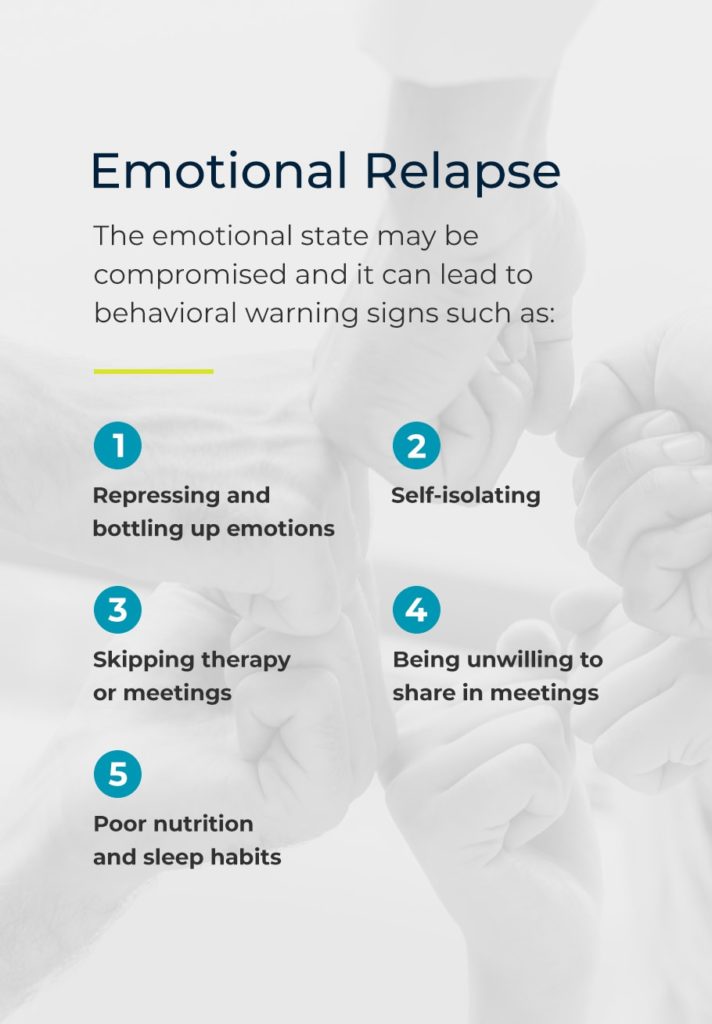
Recognizing the Stages of Relapse
Relapse is often viewed as the result of a sudden impulse, but there is actually a litany of warning signs that can show when someone is at escalating risk of using drugs or alcohol again. Relapse can be divided into three stages, each with specific signs.
1. Emotional Relapse
At first, people are not actively considering a return to drugs or alcohol. The last time the person drank or used is still fresh enough in the mind that they remember the consequences and don’t want to repeat it. However, their emotional state may be compromised and this can lead to behavioral warning signs such as:
- Repressing and bottling up emotions
- Self-isolating
- Skipping therapy or meetings
- Being unwilling to share in meetings
- Poor nutrition and sleep habits
2. Physical Relapse
If a person isn’t equipped with effective coping skills or neglects to use them to their full potential, the likelihood of acting on their urges increases. The last stage of relapse is the one most people think of first — returning to the use of drugs or alcohol.
A relapse may consist of one single use followed by a realization of the mistake, while others may last any length of time.
3. Mental Relapse
After a period of poor self-care, someone in recovery will likely experience some of the mental signs of relapse. They may begin to feel discontent with their progress and restless in their disintegrating routine. Without the proper structure and routine, a person is more likely to start thinking about using again.
A person may start making a pros and cons list to try to rationalize using again and be on the fence about whether they will do so. Only the person in recovery can recognize their own signs of mental relapse, including:
- Cravings for drugs or alcohol
- Excessive thinking about people, places or things linked to former use
- Glamorizing or minimizing the consequences of former use
- Lying and bargaining
- Coming up with ways to “control” future use
- Looking for opportunities to use
- Fantasizing about or planning for a relapse
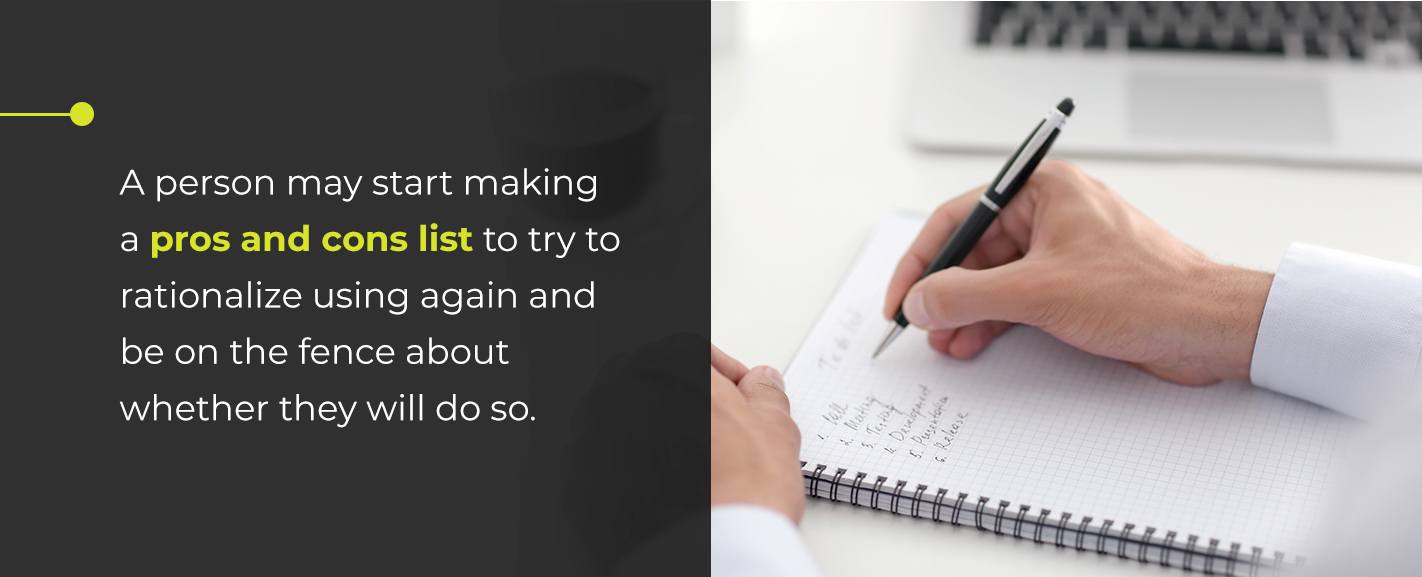
What to Do in Case of a Relapse
Relapse is not synonymous with failure. It helps to compare addiction relapse to relapse in other chronic conditions. A person with diabetes will often relapse due to poor eating behaviors, for example. If someone with diabetes relapses, they haven’t failed. They just have to reset, practice healthy eating and get their blood sugar under control with the help of their doctor.
Addiction relapses are similar in that the individual needs to seek treatment to get back on track. To overcome withdrawal symptoms, most people need some form of detoxification or withdrawal management service. A long-term, severe relapse might require residential treatment, while people with prior experience in a treatment program may do well with outpatient therapy. Whatever the course of treatment, it will involve the person identifying the reasons they relapse and learning what steps to take to prevent it in the future.
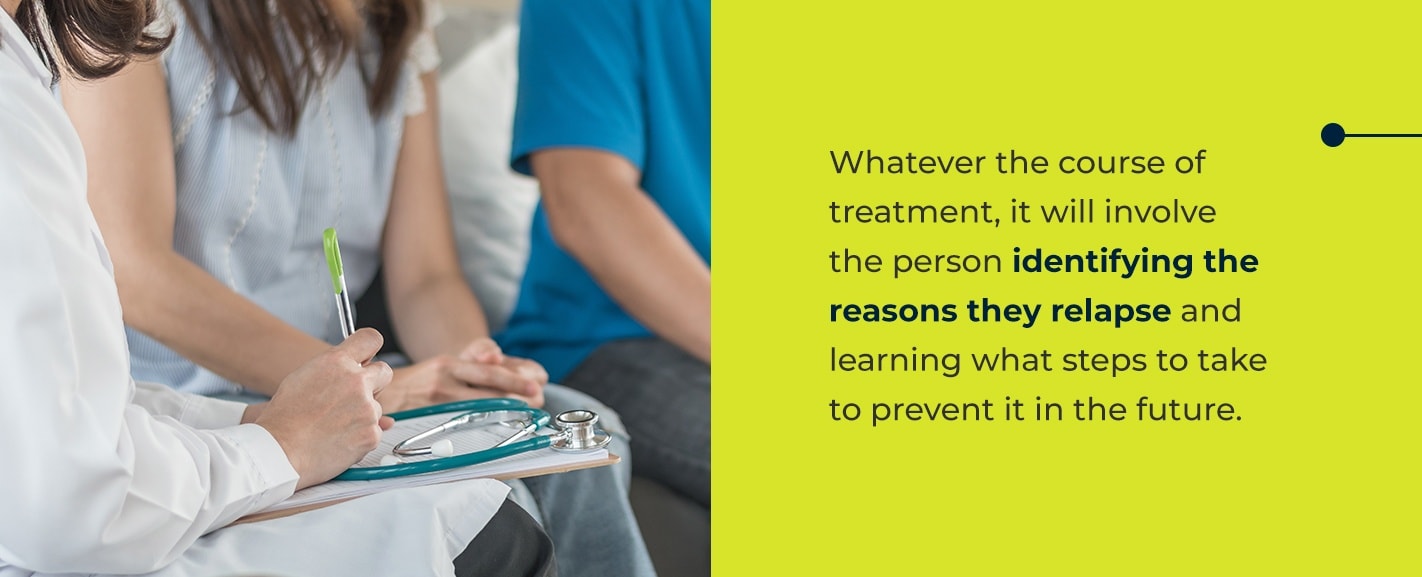
Coping Mechanisms for Recovery
Avoiding triggers is only one part of the puzzle when it comes to addiction and recovery. As we’ve mentioned a few times, it’s important to learn healthy coping mechanisms to help you handle yourself if you happen to encounter one of your triggers while you’re out in the world. Avoiding all of your triggers isn’t always an option, but running into one when you’re going about your daily business doesn’t necessarily have to trigger a relapse. Here’s a quick rundown of some of our favorite coping mechanisms.
1. Maintain a Support System
Recovery isn’t a journey that you have to take yourself. Make it a point to maintain a comprehensive support system. This could include family, friends, sponsors or other members of your addiction recovery community, just to name a few people. These need to be people that you’ll feel comfortable calling on if you encounter one of your triggers out in the world and need someone to talk to as a tool to help prevent relapse.
You don’t even have to talk to your support people in person. Send them a text message or Facetime them until the urge to relapse passes. Technology gives us the tools to stay connected to our support groups even if they’re not in the same time zone.
2. Take Steps to Distract Yourself
Another useful side effect of our technology-steeped society is that distraction is easy to come by. If you encounter a trigger in the wild, distract yourself. Pull up a video on YouTube, play a mobile game or scroll social media until you can get away from the trigger.
You might be worried that this distraction tactic might come across as rude if you’re out in public. Don’t. There’s nothing rude about taking care of yourself and avoiding triggers that could lead to a relapse.
3. Talk To Yourself
Self-talk is a powerful tool and a valuable coping mechanism if you encounter one of your triggers during your daily life. Instead of allowing the trigger to overcome you, talk to yourself logically. Explain to yourself that you recognize the trigger, you’re taking steps to remove yourself from the situation and you don’t allow the trigger to have any power over you.
It sounds silly but sometimes that little bit of assurance — even if it’s coming from your own lips — can be enough to keep the trigger from causing problems.
4. Practice Relaxation
Stress is a big trigger for a lot of people. As soon as things start getting hard, it’s tempting to turn back to addiction. Instead, learn how to practice relaxation, and how to be relaxed in any and every situation. Learning healthy ways to approach your stressors is more than just preventing it from triggering you — it can also help improve your overall physical and mental health by reducing the amount of stress you experience on a daily basis.
Keep in mind that while these are popular coping mechanisms, they might not work for everyone. Take the time to figure out what works best for you as part of your personal recovery journey.
Reinforce Recovery at Gateway
Gateway is a comprehensive addiction treatment center with more than 50 years of experience providing patients with the tools they need to identify and minimize triggers in substance abuse recovery. Recovery is a journey, and Gateway is here to help guide you on the path — we are with you for life. To learn more about our personalized, evidence-based approach to addiction treatment call Gateway at (877) 505-4673 or contact us online.
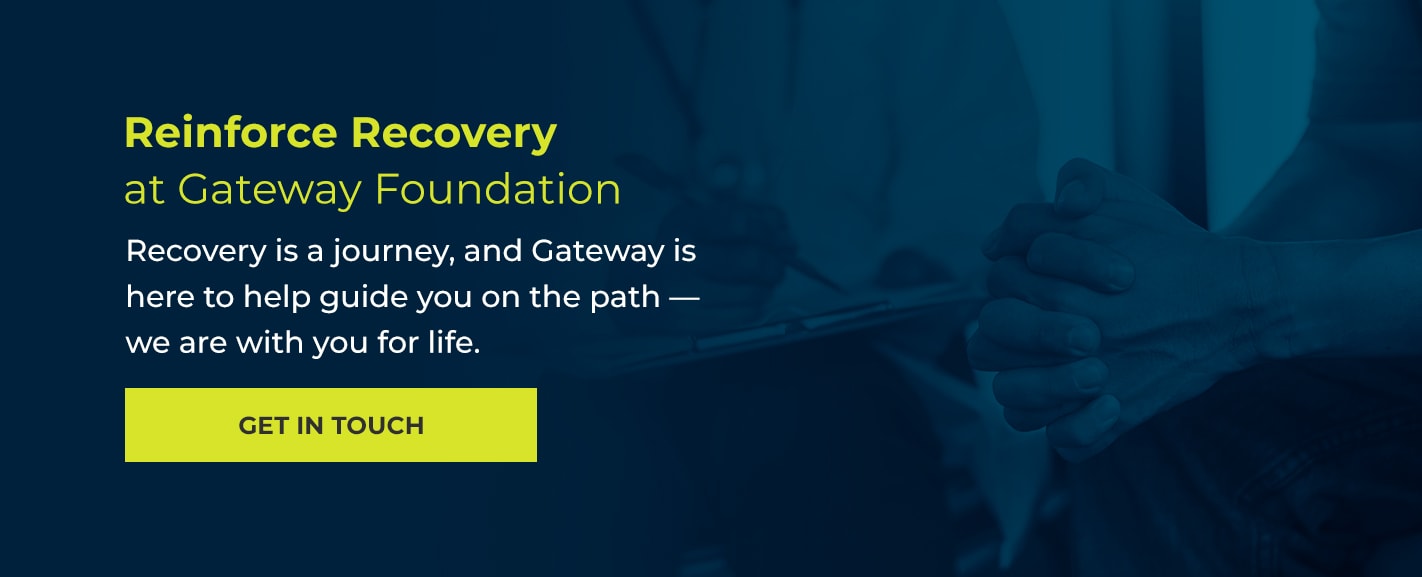

 Common Relapse Triggers
Common Relapse Triggers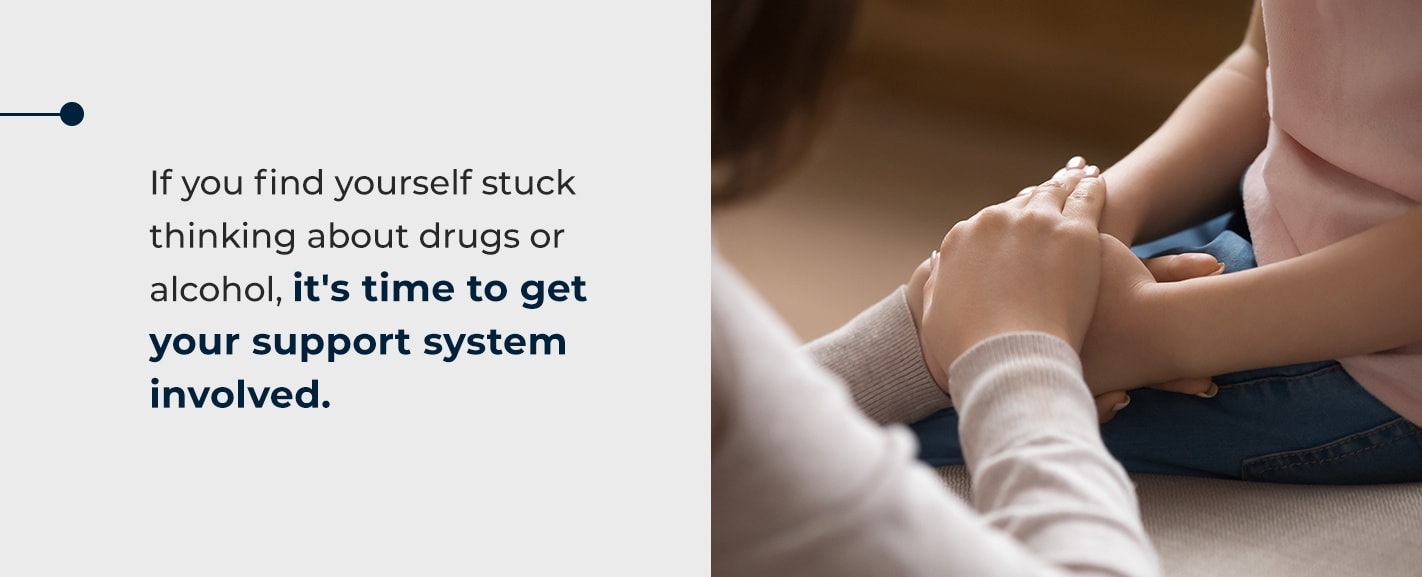 10. Places and Situations Where Drugs Are Available
10. Places and Situations Where Drugs Are Available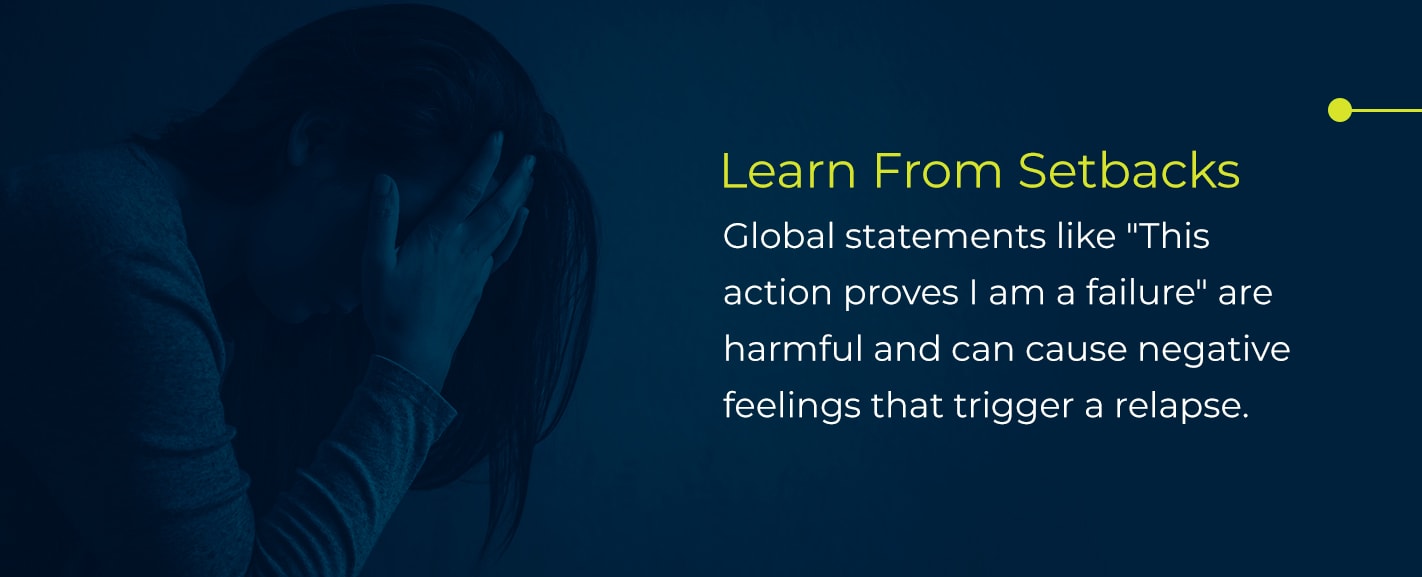 3. Become Comfortable With Discomfort
3. Become Comfortable With Discomfort
